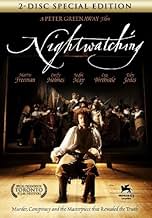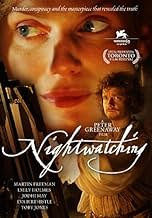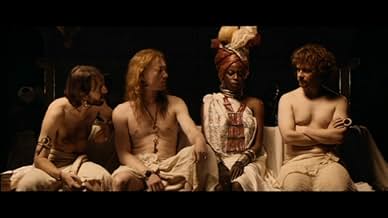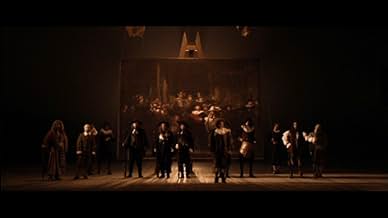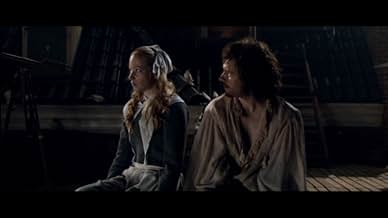IMDb RATING
6.5/10
3.6K
YOUR RATING
An extravagant, exotic and moving look at Rembrandt's romantic and professional life, and the controversy he created by the identification of a murderer in the painting 'The Night Watch'.An extravagant, exotic and moving look at Rembrandt's romantic and professional life, and the controversy he created by the identification of a murderer in the painting 'The Night Watch'.An extravagant, exotic and moving look at Rembrandt's romantic and professional life, and the controversy he created by the identification of a murderer in the painting 'The Night Watch'.
- Awards
- 6 wins & 6 nominations total
Anja Antonowicz
- Catharina
- (as Anna Antonowicz)
- Director
- Writer
- All cast & crew
- Production, box office & more at IMDbPro
Featured reviews
In my old Balkan country, we used to have a wise saying warning against bothering with a huge sack to collect fruit from a famous fruit tree. This applies almost perfectly to the last Peter Greenway's Anglo-Polish-Dutch super production, around the creation of NIGHT WATCH, one of the most famous paintings in the world. Assassination attempts were performed against this masterpiece, resulting in its sheltering behind a thick glass in the Rijk Museum, and the same shelter may be used against this strange assembly of four-letter words, (predominant in modern movies), naked bodies sometimes sculptural, sometimes dull, and a certain research in the lighting; after almost 150 minutes of sometimes boring, sometimes nonsensical dialogues, the viewer hits home with the impression that his money was stolen. Only two movie theaters adventured to expose this failure (in my eyes, but the audience was heavy and very receptive), at my 4 pm show, in the exclusive artistic district of Saint-Germain des Près.A real waste of talent and efforts. I am not ready to view another Peter Greenway movie.Harry Carasso, Paris, France
In a way, Greenaway is my touchstone for deep film experience. It was with him that I first studied the things that have since become part of every viewing experience, from "Godzilla versus the Sea Monster" to the more homeopathically transcendent meditations of Medem and Ruiz.
Each film is its own adventure, and that's part of the joy. Each film is similar in reaching for a context outside of the ordinary context of other films, so it helps if you are knowledgeable about the dynamics of those contexts. Which of those that are more natural to you will color which of his films you prefer.
I like his "book" films the best because I had prewoven worlds that he just happened to encircle. All of his looping narratives and playing with discrete objects, events and relationships strung and structured capture me when they are prominent. I'm not crazy about his projects when he drifts toward conventional narrative as he does here and away from engaging in conceptual play.
This is more like "Draughtsman's Contract" or even "Cook, Thief" than his more complex films, so many people will like it. Its also his prettiest film since he lost his long time cinematographer.
If you don't know this film, its a simple fold: its about Rembrandt creating a painting with deep, Greenaway-like meaning. The filmmaker goes to great lengths to visually make his relationship to the film be similar to Rembrandt's with the painting, and thereby fold us into the thing because we see and hear (in great detail) viewers of that painting react. And they punish our painter much like the filmmaker has been.
Threaded throughout is a rather touching story not unique in Greenaway of a man and passion, and the woman and then women he loves. And how passion and love, and creativity encompass one another and drive that energy of life that we count on artists to use to break mountains ahead of us so we can pass.
Its the women here. It is always the lovers who allow creativity, who grow it and channel it. There is no real penetration of life without it, and the night it brings. Just on the straight narrative alone, its powerful. It works. The whole thing works, and could be a theatrical success for a wider audience than usual.
The three lovers are redheads, of course.
Ted's Evaluation -- 3 of 3: Worth watching.
Each film is its own adventure, and that's part of the joy. Each film is similar in reaching for a context outside of the ordinary context of other films, so it helps if you are knowledgeable about the dynamics of those contexts. Which of those that are more natural to you will color which of his films you prefer.
I like his "book" films the best because I had prewoven worlds that he just happened to encircle. All of his looping narratives and playing with discrete objects, events and relationships strung and structured capture me when they are prominent. I'm not crazy about his projects when he drifts toward conventional narrative as he does here and away from engaging in conceptual play.
This is more like "Draughtsman's Contract" or even "Cook, Thief" than his more complex films, so many people will like it. Its also his prettiest film since he lost his long time cinematographer.
If you don't know this film, its a simple fold: its about Rembrandt creating a painting with deep, Greenaway-like meaning. The filmmaker goes to great lengths to visually make his relationship to the film be similar to Rembrandt's with the painting, and thereby fold us into the thing because we see and hear (in great detail) viewers of that painting react. And they punish our painter much like the filmmaker has been.
Threaded throughout is a rather touching story not unique in Greenaway of a man and passion, and the woman and then women he loves. And how passion and love, and creativity encompass one another and drive that energy of life that we count on artists to use to break mountains ahead of us so we can pass.
Its the women here. It is always the lovers who allow creativity, who grow it and channel it. There is no real penetration of life without it, and the night it brings. Just on the straight narrative alone, its powerful. It works. The whole thing works, and could be a theatrical success for a wider audience than usual.
The three lovers are redheads, of course.
Ted's Evaluation -- 3 of 3: Worth watching.
My advice is to first watch 'Rembrandt's J'Accuse', Greenaway's companion film. It fills you in on the background, the characters, the thesis for the conspiracy, and generally sets the scene for 'Nightwatching' itself, which is extremely elaborate and requires a far more prolonged degree of concentration than 99.9% of films being released. Having said that, the film certainly stands alone as a powerful and intelligent piece of cinema that puts forward a contentious and challenging theory about the circumstances surrounding Rembrandt's painting.
Some viewers have pointed out how moving the film is - and indeed it is. But I for one have found ALL of Greenaway's films to be deeply moving. Unlike mainstream directors, he doesn't attempt to tug at the heartstrings, but instead deploys one rich, elegaic, achingly beautiful set piece after another, letting the ideas and associations reach the emotions of the audience. In Greenaway's world, extreme beauty and extreme horror exist cheek-by-jowl - his heroes (more so than his heroines) look for logic and order, and find ultimately chaos and decay - the good go unrewarded, the bad go unpunished - and yet, out of it all, rises a triumphant celebration of life, art, human aspiration, and the possibilities of cinema itself.
If you want a bedtime story about goodies overcoming baddies, look elsewhere. 'Nightwatching', like Greenaway's other work, offers - and demands - much more than that.
Some viewers have pointed out how moving the film is - and indeed it is. But I for one have found ALL of Greenaway's films to be deeply moving. Unlike mainstream directors, he doesn't attempt to tug at the heartstrings, but instead deploys one rich, elegaic, achingly beautiful set piece after another, letting the ideas and associations reach the emotions of the audience. In Greenaway's world, extreme beauty and extreme horror exist cheek-by-jowl - his heroes (more so than his heroines) look for logic and order, and find ultimately chaos and decay - the good go unrewarded, the bad go unpunished - and yet, out of it all, rises a triumphant celebration of life, art, human aspiration, and the possibilities of cinema itself.
If you want a bedtime story about goodies overcoming baddies, look elsewhere. 'Nightwatching', like Greenaway's other work, offers - and demands - much more than that.
A good film but long, and one has to be something of an aficionado of Greenaway to enjoy this one. Beautifully lit and visually composed with an insistent Nymanesque score and a witty script this not only benefits from but demands several viewings from the Stoppard of cinema. I warmed to Martin Freeman as Rembrandt, a new actor to me, as the film went on for his combination of high art, low sex and comfortable domesticity. He was no more moral than those whose foibles he sought to expose, but he was certainly more likable. It is not really possible to follow the 33 people (and dog) in the eponymous painting and the mysteries tat Greenaway seeks to solve, which make more sense in his documentary "Rembrandt's J'Accuse" than they do in this film – both are packaged together in the DVD. I would not say this is less demanding than his recent films, though it is certainly more accessible, and his best since the scandalously unavailable "Drowning by Numbers".
Once again, Peter Greenaway has created a film that holds your attention, and tells a story in a very captivating way.
What I found most ironic, and what really bowled me over, was how "unexperimental" this film seemed. After his recent directorial forays ("8 1/2 Women" and the "Tulse Luper Suitcases" come to mind), "Nightwatching" will seem unexpectedly boring in comparison. One might anticipate a visual spectacle, an overwhelming of the senses as seems to be Greenaway's modus operandi. The real richness of "Nightwatching" is in the little things, the simplest of details, and the pure joy of watching a master working within a more traditional cinematic framework.
When I think of the impact "Nightwatching" had on me initially, I am reminded of a similar experience when I recently viewed Lars Von Trier's "Antichrist". I was rather caught off-guard by "Antichrist's" lack of overt experimentation. But as someone who appreciates subtlety and nuance in film, I felt my time was well-spent. Plus, there's nothing I like more than walking away feeling as if I haven't been spoon-fed a story, that I've been allowed to use my BRAIN, and fill in the blanks a bit as the story moves along.
I find it doubly ironic that this film was released internationally in 2007, and only recently released domestically in the US (2010), and to lukewarm reviews at best. Greenaway is an artist never to be underestimated, and I implore you to give this film your utmost attention. It's also kinda cool to see Greenaway "geek out" a bit -- he's so obsessed with Remembrandt and all things Dutch, enjoy!
What I found most ironic, and what really bowled me over, was how "unexperimental" this film seemed. After his recent directorial forays ("8 1/2 Women" and the "Tulse Luper Suitcases" come to mind), "Nightwatching" will seem unexpectedly boring in comparison. One might anticipate a visual spectacle, an overwhelming of the senses as seems to be Greenaway's modus operandi. The real richness of "Nightwatching" is in the little things, the simplest of details, and the pure joy of watching a master working within a more traditional cinematic framework.
When I think of the impact "Nightwatching" had on me initially, I am reminded of a similar experience when I recently viewed Lars Von Trier's "Antichrist". I was rather caught off-guard by "Antichrist's" lack of overt experimentation. But as someone who appreciates subtlety and nuance in film, I felt my time was well-spent. Plus, there's nothing I like more than walking away feeling as if I haven't been spoon-fed a story, that I've been allowed to use my BRAIN, and fill in the blanks a bit as the story moves along.
I find it doubly ironic that this film was released internationally in 2007, and only recently released domestically in the US (2010), and to lukewarm reviews at best. Greenaway is an artist never to be underestimated, and I implore you to give this film your utmost attention. It's also kinda cool to see Greenaway "geek out" a bit -- he's so obsessed with Remembrandt and all things Dutch, enjoy!
Did you know
- TriviaDirector Peter Greenaway has said of this film: "The 'painter film' is a small genre of its own: Michelangelo, Rembrandt himself (at least twice), Modigliani, Caravaggio, etc, and none more so than just lately. Picasso, Van Gogh (repeatedly), Bacon, Vermeer, and now Goya have received the treatment. I suppose our major aim in the film Nightwatching, apart from trying to match the Master's mastery of light, is to demonstrate Rembrandt as social moralist: it contains a murder mystery - the unraveling of which is the heart of the film. And also to regard Rembrandt as an inventor of cinema before the Lumière brothers...We tried to rise to the challenge in the film, remaking, with high definition digital tape, that upper right-hand corner space of Velázquez's Las Meninas - the area between the walls and ceiling has been described as the greatest bit of painting ever - a painting which is just and only and magnificently a painting of a block of darkly contrasting air. We, too, attempting a grand response Rembrandt image of light, tried to film a block of air that insubstantially floats, irrespective of walls and ceiling. Godard said that the cinema was the truth 24 frames a second. Can painting go better and say that paintings are the truth for all time? What's a second in cinema time if you can have an eternity in painting time? Cinema has come and gone in 112 years. What, then, is the age of painting?".
- GoofsAt 1:36:42 Rembrandt says that Geertje doesn't wash herself. Just 1 minute later he says he saw her undressing to wash.
- Quotes
Titia Uylenburgh: Women in the 17th century are allowed to smoke, write, correspond with Descartes, wear spectacles, insult the Pope, and breast-feed babies.
- ConnectionsFeatured in Rembrandt's J'Accuse...! (2008)
- How long is Nightwatching?Powered by Alexa
Details
- Release date
- Countries of origin
- Official sites
- Language
- Also known as
- Nightwatching
- Filming locations
- Production companies
- See more company credits at IMDbPro
Box office
- Budget
- $7,500,000 (estimated)
- Gross worldwide
- $698,544
- Runtime
- 2h 14m(134 min)
- Color
- Sound mix
- Aspect ratio
- 2.35 : 1
Contribute to this page
Suggest an edit or add missing content


